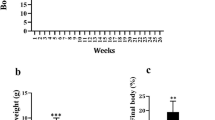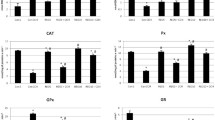Abstract
Experimental evidence highlights the importance of dietetic factors on breast cancer. In this work we aimed to analyze the effects two oils, corn oil (rich in n-6 polyunsaturated fatty acids -PUFA-) and extra virgin olive oil (EVOO), on oxidative stress in an animal model of breast carcinogenesis. Female rats were fed a low-fat control, a high-corn oil, or a high-EVOO diet from weaning or after induction with 7,12-dimethylbenz[a]anthracene at 53 days. Animals were euthanized at 36, 51, 100 and 246 days of age. We analyzed antioxidant enzymes (mRNA and activity of superoxide dismutase, glutathione peroxidase and catalase), non-enzymatic capacity (oxidized and reduced glutathione) and DNA damage (8-oxo-dG) in tumors and mammary gland at different ages. We also analyzed lipid peroxidation (isoprostanes in serum and lipofuscin in liver). Results indicated a decrease in the enzymatic antioxidant capacity and increased oxidative stress in mammary gland of healthy young animals after a short period of high-fat diets intake, followed by an adaptation to chronic dietary intervention. After induction both diets, especially the one high in n-6 PUFA, increased the oxidized glutathione. In tumors no clear effects of the high-fat diets were observed, although in the long-term lipofuscin and 8-oxo-dG suggested greater oxidative damage by effect of the n-6 PUFA-rich diet. Considering the differential effects of these diets on mammary carcinogenesis that we have previously reported, this study suggests that these high-fat diets could have an effect on oxidative stress that would lead to different signaling pathways.





Similar content being viewed by others
References
Bray F, Ferlay J, Soerjomataram I, Siegel RL, Torre LA, Jemal A (2018) Global cancer statistics 2018: GLOBOCAN estimates of incidence and mortality worldwide for 36 cancers in 185 countries. CA-Cancer J Clin 68:394–424
WCRF/AICR - World Cancer Research Fund/American Institute for Cancer Research (2007) Food, nutrition, physical activity, and the prevention of cancer: a global perspective. American Institute for Cancer Research, Washington
Escrich E, Solanas M, Moral R (2006) Olive oil, and other dietary lipids in cancer: experimental approaches. In: Quiles JL, Ramirez-Tortosa MC, Yaqoob P (eds) Olive oil and health. CABI Publishing, Oxford, pp 317–374
Schwingshackl L, Schwedhelm C, Galbete C, Hoffmann G (2017) Adherence to mediterranean diet and risk of cancer: an updated systematic review and meta-analysis. Nutrients 9:E1063
Foscolou A, Critselis E, Panagiotakos D (2018) Olive oil consumption and human health: a narrative review. Maturitas 118:60–66
Amel N, Wafa T, Samia D, Yousra B, Issam C, Cheraif I, Attia N, Mohamed H (2016) Extra virgin olive oil modulates brain docosahexaenoic acid level and oxidative damage caused by 2,4-Dichlorophenoxyacetic acid in rats. J Food Sci Technol 53:1454–1464
Escrich E, Solanas M, Moral R, Escrich R (2011) Modulatory effects and molecular mechanisms of olive oil and other dietary lipids in breast cancer. Curr Pharm Des 17:813–830
Kumari S, Badana AK, Malla R (2018) Reactive oxygen species: a key constituent in cancer survival. Biomark Insights 13:1177271918755391
Saha SK, Lee SB, Won J, Choi HY et al (2017) Correlation between oxidative stress, nutrition, and cancer initiation. Int J Mol Sci 18:1544
Kryston TB, Georgiev AB, Pissis P, Georgakilas AG (2011) Role of oxidative stress and DNA damage in human carcinogenesis. Mutat Res 11:193–201
Visioli F, Grande S, Bogani P, Galli C (2004) The role of antioxidants in the Mediterranean diets: focus on cancer. Eur J Cancer Prev 13:337–343
Presti G, Guarrasi V, Gulotta E, Provenzano F et al (2017) Bioactive compounds from extra virgin olive oils: correlation between phenolic content and oxidative stress cell protection. Biophys Chem 230:109–116
Escrich R, Costa I, Moreno M, Cubedo M, Vela E, Escrich E, Moral R (2019) A high-corn-oil diet strongly stimulates mammary carcinogenesis, while a high-extra-virgin-olive-oil diet has a weak effect, through changes in metabolism, immune system function and proliferation/apoptosis pathways. J Nutr Biochem 64:218–227
Cordain L, Eaton SB, Sebastian A, Mann N et al (2005) Origins and evolution of the Western diet: health implications for the 21st century. Am J Clin Nutr 81:341–354
Escrich E, Solanas M, Segura R (1994) Experimental diets for the study of lipid influence on induced mammary carcinoma in rats: I-diet definition. In vivo 8:1099–1105
Escrich E, Solanas M, Ruiz de Villa MC, Ribalta T, Muntane J, Segura R (1994) Experimental diets for the study of lipid influence on induced mammary carcinoma in rats: II-suitability of the diets. In vivo 8:1107–1111
Solanas M, Hurtado A, Costa I, Moral R, Menendez JA, Colomer R, Escrich E (2002) Effects of a high olive oil diet on the clinical behavior and histopathological features of rat DMBA-induced mammary tumors compared with a high corn oil diet. Int J Oncol 21:745–753
Costa I, Solanas M, Escrich E (2002) Histopathologic characterization of mammary neoplastic lesions induced with 7,12-dimethylbenz(α)antracene in the rat. A comparative analysis with human breast tumours. Arch Pathol Lab Med 126:915–927
Venkatraman JT, Pinnavaia L (1998) Effects of saturated, ω-6 and ω-3 lipids on activities of enzymes involved in antioxidant defense in normal rats. Nutr Res 18:341–350
Cnubben NH, Rietjens IM, Wortelboer H, van Zanden J, van Bladeren PJ (2001) The interplay of glutathione-related processes in antioxidant defense. Environ Toxicol Phar 10:141–152
Kannan N, Nguyen LV, Makarem M, Dong Y et al (2014) Glutathione-dependent and -independent oxidative stress-control mechanisms distinguish normal human mammary epithelial cell subsets. Proc Natl Acad Sci USA 111:7789–7794
Moral R, Escrich R, Solanas M, Vela E, Costa I, Ruiz de Villa MC, Escrich E (2011) Diets high in corn oil or extra-virgin olive oil provided from weaning advance sexual maturation and differentially modify susceptibility to mammary carcinogenesis in female rats. Nutr Cancer 63:410–420
Sospedra I, Moral R, Escrich R, Solanas M, Vela E, Escrich E (2015) Effect of high fat diets on body mass, oleylethanolamide plasma levels and oxytocin expression in growing rats. J Food Sci 80:H1425–H1431
Solanas M, Grau L, Moral R, Vela E, Escrich R, Escrich E (2010) Dietary olive oil and corn oil differentially affect experimental breast cancer through distinct modulation of the p21Ras signaling and the proliferation-apoptosis balance. Carcinogenesis 31:871–879
Da Silva MS, Bilodeau JF, Julien P, Rudkowska I (2017) Dietary fats and F2-isoprostanes: A review of the clinical evidence. Crit Rev Food Sci Nutr 57:3929–3941
Brunk UT, Terman A (2002) Lipofuscin: mechanisms of age-related accumulation and influence on cell function. Free Radical Bio Med 33:611–619
Yeldandi AV, Rao MS, Reddy JK (2000) Hydrogen peroxide generation in peroxisome proliferator-induced oncogenesis. Mutat Res 448:159–177
Maynard S, Schurman SH, Harboe C, de Souza-Pinto NC, Bohr VA (2009) Base excision repair of oxidative DNA damage and association with cancer and aging. Carcinogenesis 30:2–10
Acknowledgements
This work was supported by grants from “Plan Nacional I +D+I” (AGL2006-07691, AGL2011-24778), “Fundación Patrimonio Comunal Olivarero (FPCO)” (FPCO2008-165.396; FPCO2013-CF611.084), “Agencia para el Aceite de Oliva del Ministerio de Agricultura, Alimentación y Medio Ambiente” (AAO2008-165.471), “Organización Interprofesional del Aceite de Oliva Español (OIAOE)” (OIP2009-165.646), “Departaments de Salut i d’Agricultura, Alimentació i Acció Rural de la Generalitat de Catalunya” (GC2010-165.000), FPCO and OIAOE (FPCO-OIP2016-CS614.268). The sponsors had no role in the study design, data collection and analysis and interpretation of the results. We thank Dr. Eduard Escrich, director of the research group “Grup Multidisciplinari per a l’Estudi del Càncer de Mama”, for providing the means and infrastructure to develop this study.
Author information
Authors and Affiliations
Corresponding authors
Ethics declarations
Conflicts of interest
The authors declare that they have no conflict of interest.
Ethics approval
Institutionally approved experimental animal protocol (CEEAH 566/3616).
Informed consent
All authors have read and approved the manuscript, and all of them are aware of its submission to the Molecular Biology Reports.
Additional information
Publisher's Note
Springer Nature remains neutral with regard to jurisdictional claims in published maps and institutional affiliations.
Rights and permissions
About this article
Cite this article
Escrich, R., Vela, E., Solanas, M. et al. Effects of diets high in corn oil or in extra virgin olive oil on oxidative stress in an experimental model of breast cancer. Mol Biol Rep 47, 4923–4932 (2020). https://doi.org/10.1007/s11033-020-05492-6
Received:
Accepted:
Published:
Issue Date:
DOI: https://doi.org/10.1007/s11033-020-05492-6




